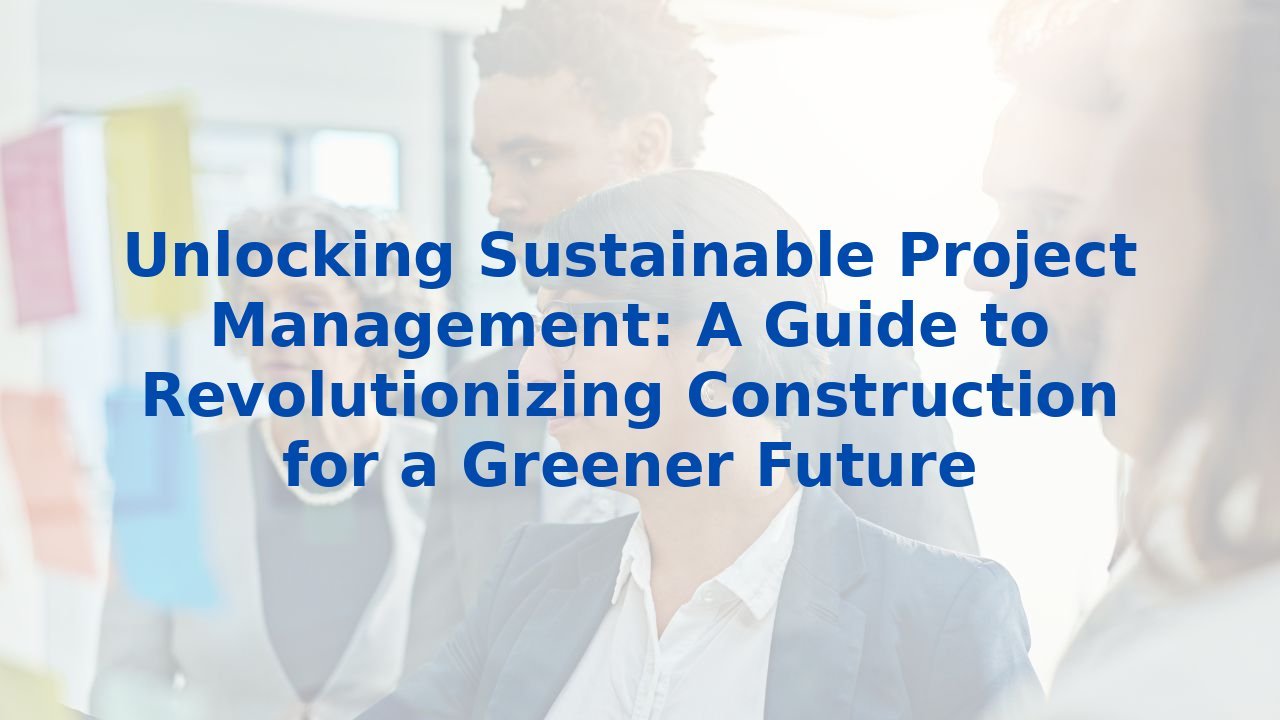Unlocking Sustainable Project Management: A Guide to Revolutionizing Construction for a Greener Future
Unlocking Sustainable Project Management: A Guide to Revolutionizing Construction for a Greener Future
Understanding Sustainable Project Management
Sustainable project management is a proactive approach that intertwines environmental, social, and governance (ESG) principles at every stage of the project lifecycle. This methodology goes beyond merely completing tasks; it ensures that projects deliver benefits not just economically, but also socially and environmentally. The foundation lies in careful planning, resource optimization, and continuous monitoring—all oriented toward minimizing waste and maximizing efficiency.
Revolutionizing Our Approach to Projects
To truly embrace sustainable project management, we need to implement practices that redefine how we approach projects. Here are the top practices driving this revolution:
Resource Optimization
The backbone of sustainable project management is effective resource optimization. By leveraging advanced analytics, organizations can utilize AI to examine data on material usage, energy consumption, and labor efficiency. This data-driven approach allows for tailored resource allocation, minimizing waste and enhancing productivity. The gains from such optimization are multi-faceted, affecting not only the bottom line but also the environmental footprint of projects.
Data-Driven Decision Making
One of the treasures of the modern era is our access to real-time data. AI enhances decision-making by providing predictive analytics that identify potential disruptions or inefficiencies well in advance. Armed with this intelligence, project managers can make informed decisions that align with their sustainability goals, ensuring that projects stay on track and within the bounds of environmental responsibility.
Integrating ESG Principles
Embedding ESG principles is essential for compliance and competitive advantage. AI solutions can track ESG performance throughout the supply chain, providing invaluable insights that ensure ongoing adherence to these principles. By continually measuring and analyzing their impact, organizations can confidently navigate the complexities of modern regulations while reinforcing their reputation among stakeholders.
Proactive Risk Management
In a world where natural disasters are increasingly frequent, predictive capabilities are no longer optional. AI can assess seismic data and simulate potential impacts, enabling organizations to enhance infrastructure resilience. This proactive risk management not only mitigates potential losses but also reassures stakeholders of a commitment to public safety.
Designing Smart Cities and Circular Processes
AI has the potential to revolutionize urban planning through smart designs and circular systems that optimize resource use. By aligning energy consumption with climatic conditions, we can reduce inefficiencies and contribute to low-carbon energy systems. Embracing such innovative designs fosters a sustainable ecosystem of living and working.
The Journey: Historical Context and Current State
Sustainable project management has significantly evolved, particularly with the advent of AI. Historically, organizations that embraced data-driven solutions witnessed improvements in efficiency and project outcomes. However, despite the progress, challenges like greenwashing persist. Genuine commitment is crucial, and AI facilitates transparency by providing reliable data reflecting true sustainability efforts.
Actionable Recommendations for Embracing Sustainable Practices
To foster a culture of sustainability in project management, here are steps that organizations can take:
Invest in AI Training
Training is essential. By educating employees on the intricacies of AI, organizations equip them to interpret data effectively and leverage these insights for decision-making. Performance-based assessments ensure competency in applying AI-driven insights where they matter most. This investment isn’t just financial—it's an investment in long-term sustainability.
Embed Sustainability Across the Enterprise
Cultural transformation is as crucial as technological advancement. Leaders must champion sustainability to instill a long-term mindset among employees. When teams are empowered to act on sustainability initiatives, the collective impact becomes substantial. Creating an environment that celebrates sustainability allows each voice to contribute meaningfully toward greener practices.
Integrate AI-Driven Solutions
Tailoring AI solutions to meet sustainability objectives is a game-changer. By utilizing cloud-based reporting tools, organizations can make sustainability data readily accessible, both internally and for external stakeholders. This transparency fosters accountability and showcases achievements, providing a clear roadmap for sustainable construction initiatives.
Foster a Culture of Learning and Growth
Building workforce capability is vital for integrating sustainability into project management. Training employees not just in technology but in sustainability principles ensures they effectively utilize AI tools. This alignment enables each team member to participate in meaningful change, reinforcing a commitment to sustainability within their day-to-day responsibilities.
Conclusion
By embracing sustainable project management practices and integrating AI into our methodologies, we unlock the potential for construction that not only delivers immediate results but also serves the planet for generations to come. This call to action is not merely a trend; it’s the foundation for a sustainable future.



